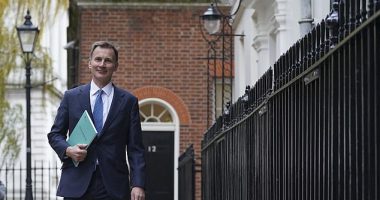
Britons now consider the rising cost of living as their biggest money concern.
Almost half are concerned about it, according to Aldermore Bank’s latest savings tracker, which surveyed 4,000 UK adults.
Households currently face a perfect storm of financial strain from the forthcoming National Insurance contribution rise, jump in energy price cap and fuel costs, alongside bigger food shopping bills, and other bills rising with inflation.
These costs combined, would mean a worker earning £30,000 faces an additional cost burden of £1,128 a year from April, according to estimates by Interactive Investor.


Nearly a quarter of UK adults say they do not have any funds saved in case of an emergency.
One in five Britons are worried about not having adequate emergency funds in case of unexpected expenses, according to Aldermore.
A similar number are also mindful of health costs, while many are equally still worrying about the impact of Brexit on the economy.
Not being able to afford a good quality of life and not having enough money for retirement are also major worries shared by a large number of Britons.
Ewan Edwards, head of savings at Aldermore said: ‘With inflation at a 30 year high, and energy bills predicted to increase by over 50 per cent, more households across the country will be feeling the effects on their disposable income.
‘As the cost of living rises, we’d encourage people to be proactive in planning for it, so they do not feel underprepared.
‘Taking positive action to review personal finances, budget, and save can make all the difference in maintaining long term financial stability.’
| Top ten money worries | Percentage citing it as a concern |
|---|---|
| Rising costs of living | 47% |
| My health | 21% |
| Not have enough money for unexpected expenses | 20% |
| The impact of Brexit on the economy | 20% |
| Not being able to afford a good quality of life | 17% |
| Not having enough money for retirement | 15% |
| A slow economic recovery | 15% |
| Not being able to pay bills | 14% |
| Not being able to go on holiday | 11% |
| Potential of losing my job/wage decreases | 8% |
What’s behind the worries?
A third of households were spending more than their income even before Covid struck, according to the Office for National Statistics, and barely half had a financial buffer that would cover their excess outgoing for a year.
With economists warning that families are set to be £2,500 worse off this year as the world reels from the standoff over Ukraine, it isn’t surprising that many will be fearing the cost of living squeeze in 2022 could prove catastrophic for their finances.
Two in five UK adults are worried about their financial future, according to Aldermore, and more than a quarter say that their current financial situation is not sustainable.
Similarly, two in five weren’t able to save last year, with one in three saying this was due to having no money left after outgoings and bills.
With inflation having hit 5.5 per cent as of January and predicted to peak at 8.3 per cent this Spring this is likely to get worse, indicating many could begin to struggle amidst the rising cost of living.
And yet, over a third of UK adults haven’t made any plans to combat the rise in living costs.
Of those that are trying to mitigate the cost of living crisis confronting us in 2022 many are focusing on cutting spending on non-essential or luxury items.
Of those who have taken steps to prepare themselves for the increased costs of living, a third said they will be shopping less frequently for non-essentials such as clothes and toys, 28 per cent will reduce spending on socialising and 22 per cent plan to shop in lower-cost supermarkets.
Cutting back on holidays abroad, switching energy providers, using cheaper forms of travel and canceling streaming subscriptions such as Netflix were also all cited as actions that a large number of Britons plan to employ to counteract the cost of living crisis.
| Rising inflation actions | Percentage |
|---|---|
| Shopping less frequently for non-essentials (e.g. clothes, toys) | 33 % |
| Reducing spend on socialising (e.g. dining at restaurants, bars) | 28% |
| Shop in other supermarkets to save money | 22% |
| Cutting back on holidays abroad | 18% |
| Switch energy providers to ensure I am on the best deal | 15% |
| Cycle/walk to and from places more rather than using a form of transport | 11% |
| Cancel streaming subscriptions (e.g. Netflix) | 10% |
| Working from home more instead of commuting | 9% |
| Use my car less and use public transport more instead | 8% |
| Move savings into equities and investments | 6% |
| Use some savings to pay off some of my mortgage | 4% |
| Switch mortgage providers and lock in a cheaper deal | 4% |
Nearly a quarter of Britons also said they do not have any funds saved in case of an emergency, and of those who do have an emergency fund, one in three say it would last them less than a month without an income.
This rises to just over half who say it would last less than three months without any income.
Edwards added: ‘It’s concerning that our research shows over half of UK adults do not have enough to last three months without an income, with a quarter having no rainy day fund at all.
‘I’d advise everyone to start growing an emergency fund as it is hugely beneficial in acting as a buffer against unexpected costs and easing the stresses that can come with it.
‘As living costs rise in 2022 and possibly beyond, it’s more vital than ever to nurture good financial health.’
Will further base rate rises inspire savers?
The increased cost of living is unsurprisingly proving a major barrier for Britons appetite to save.
According to separate research by Paragon Bank, three in five Britons admit to struggling to maintain savings commitments, with one third highlighting the increased cost of living as the main obstacle.
Of those who didn’t save anything last year, one in five said that poor interest rates meant there was little point, according to Aldermore’s analysis.
The hope then, is that the recent base rate rises may inspire people to build up that emergency fund.
Nearly a third of Britons said rate rises will encourage them to save more in 2022, rising to 45 per cent among 18 to 34 year olds.
However, many will likely be wondering when the base rate rise will be passed on in savings deals.
The savings market is divided between smaller challenger banks and building societies pushing rates up at the top of the market and larger banks refraining from passing on any benefit to savers.
The best easy access deals are currently offered by Cynergy Bank, Tandem Bank and Yorkshire Building Society paying between 0.77 per cent and 0.82 per cent.
The worst easy access deals are offered by the high street banks paying often as little as 0.01 per cent.
In fact, the interest rates paid by the
bottom half of all easy access savings accounts pay 0.2 per cent or less, according to analysis on behalf of Investec by Andrew Hagger, founder of Moneycomms.
As of last month, that’s 90 easy access deals out of a possible 164 paying 0.2 per cent or less – Less than a quarter as much as the best deal offered on the market.
With most of the bottom half containing the biggest names, it is perhaps not surprising therefore that over 70p in every £1 saved into easy access savings deals in the UK is languishing in an accounts paying 0.1 per cent or less.









